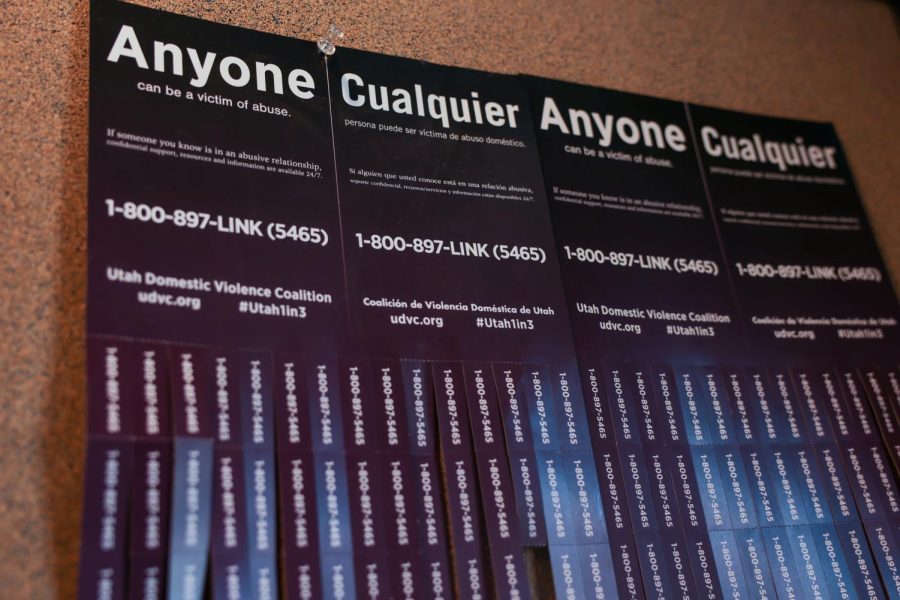Cushman: Utah’s Abortion Trigger Law Harms SA Survivors
Rape Recovery Center call to action flyer at the Rape Recovery Center, Salt Lake City, Utah on July 21, 2022. (Photo by Amen Koutowobe | The Daily Utah Chronicle)
July 28, 2022
The overturning of Roe v. Wade has deeply affected all people who can carry children. Among the most impacted, however, are rape survivors. In some states, they now face harsher abortion laws than before Roe v. Wade was established.
Many post-Roe trigger laws made no exceptions for abortion access, even in the case of rape. And while Utah’s trigger law does allow rape survivors to access abortion services if they report their assault to police, it nonetheless marks a step back for sexual assault survivors in our state. We should never force survivors to report their assault — a potentially retraumatizing process — to receive abortion healthcare.
The Principle of Optional Reporting
During this year’s legislative session, Utah state leaders passed H.B. 228. This allowed sexual assault survivors access to crime victims’ reparations funds regardless of whether they file a police report. H.B. 228 marked a significant change in our legislature’s understanding of trauma and the aftermath of SA.
In Utah, one in six women report having been raped at some point in their lives and one in three have been sexually assaulted. An estimated 70% of sexual assault victims do not report their SA to the police. Sonya Martinez-Ortiz, the executive director of Utah’s Rape Recovery Center explained that survivors have a number of reasons for not wanting to report their assault to police. She cited fear of not being believed, fear of retaliation from their rapist, not processing the gravity of their assault or fear of financial consequences as a few examples.
Beyond those reasons, some survivors also fear the criminal justice process itself. Survivors who try to seek justice by working with law enforcement often describe the experience as a “secondary victimization.” Getting questioned about the details of an assault not only forces a survivor to verbally relive it, but can also easily make survivors feel as though interrogators doubt their experience.
Knowing all of this, we can see exactly why H.B. 228 matters so much for survivors. It respects that they deserve to choose what their healing journey looks like and if it involves law enforcement.
The Harm in Utah’s Trigger Law
Utah’s abortion trigger law shirks the trauma-informed principles behind H.B. 228. Passed in 2020, it requires physicians performing abortions in cases of rape to verify that the rape has been reported to police. Essentially, the ban tells one in six Utah women, many of whom would choose not to report their assault, that they do not have a choice if they need an abortion after a rape.
In the last few years, conversations about sexual assault have become more open with more discussion about rape myths, believing survivors and things like the #MeToo movement. We’ve also seen some of our state leaders take action to make more trauma-informed laws and ensure sexual assault is taken seriously in our state. Martinez-Ortiz referenced Rep. Angela Romero’s work to clear Utah’s rape kit backlog, legislation allowing survivors to restrict their rape kits from police, and H.B. 228 as crucial legal steps for SA survivors in Utah.
Utah’s criminal abortion ban marks a clear step backward in our state’s treatment of survivors.
Martinez-Ortiz explained that it “deprives survivors of their autonomy and their ability to privately decide where and when to report their assault. That is important to survivors because sexual assault already fundamentally deprives a person of independence over their bodies, freedom and choices.” She also expressed concern that the law “will only discourage survivors from obtaining services or coming forward.”
Arkansas’ trigger law wholly banned abortion, even in cases of rape or incest. The sponsor of the legislation said that his opinion was informed by the testimony of some survivors that expressed “mental anguish” after receiving an assault-induced abortion. He equated the experiences of some survivors with the experiences of all of them. He stole their choice and bodily autonomy after it had already been ripped from them in one of the most harmful ways.
While Utah’s abortion ban allows an exception for rape, it still harms survivors in the same fundamental way. It takes away their freedom over what to do in the aftermath of a sexual assault. These are people that have already had their bodily autonomy stolen. We need to give survivors the choices they inherently deserve, rather than dictate how they process and move forward after an assault.
We shouldn’t ignore the optional reporting principles established in H.B. 228 when it comes to abortion. Until we can learn to make legislation that is wholly trauma-informed, with abortion, access to reparations and in criminal investigations, our culture will remain unsafe for survivors. Until we make consent and autonomy central to our rights and laws, we cannot take real preventative action against SA.









